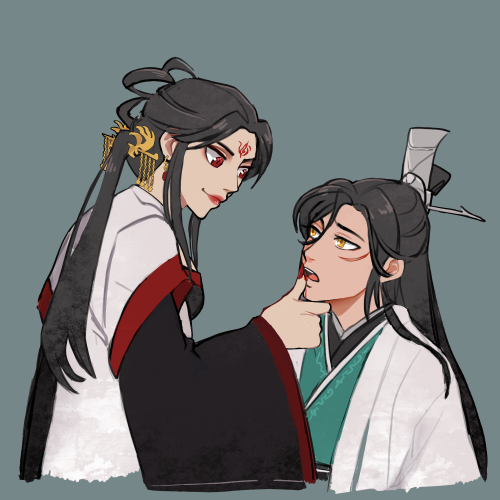Shen Qiao X Wan Yushi “Thousand Autumns” By Meng Xi Shi

Shen Qiao x Wan Yushi “Thousand Autumns” by Meng Xi Shi

More Posts from Qiulangjun and Others










@fruitier-mushroom @i-am-a-brogle
@manusilvestre my most beautiful Emma tagged me 😘










tagging: @spooky-kakashi @rechenzentrum @luzmi191 @chepib3 Idk I've already tagged so many people these past few days I feel like they r so close to unfollowing me 😔
Fake Shen Jiu fans: he is my tsundere baby :) he didn't do anything wrong you guys just don't get him. He is mommy material I swear :) I fucking hate Yue Qingyuan btw.
Real Shen Jiu fans: I need to write a paper on him I need to analyse him so bad and give a presentation about it. I want to pick him up by the scruff and shake shake shake him. I think it would've been funny if he dropkicked Binghe into the abyss just saying.
Disclaimer that by saying this I by no means mean to insult or exclude non-writers, but: Scum Villain really is a story for storytellers, huh
It's so incredibly meta - so much of it is about the way stories are told, the structures of plot and narrative logic, the way that plot drives character and character drives plot, examination of story devices that make sense in-world and how strange they look when divorced from narrative context, exploring the limits of the suspension of disbelief and the backlash when readers hit those limits and recoil, even without getting into the meditation on external pressures and the warping effect of deadlines and money on a storyteller's craft.
in scum villain the story tools (tropes, framing, character arcs, licensing) are the plot, and the plot is a tool in the story, and the author's problems are Airplane's problems and his problems are the author's problems and the main character is the reader and he brings the reader's eye into the story and his meta-knowledge becomes his greatest asset and also his greatest blindness, just the way that a self-aware reader can get more out of a story but can also by their very cynical meta-awareness block themselves from unabashed enjoyment of it
I think it's not a coincidence that so many people who have spent years writing get so hung up on this series.
wuxia, xianxia, and cultivation differences meta
translations: wuxia 武俠, xianxia 仙俠, and cultivation 修真/修仙 (xīuzhēn/xīuxiān)
think i've seen posts on this eons ago, and i'm pretty sure there are tons of these online, but since this has been written up already let's just have another one.
wuxia 武俠
wuxia and xianxia sound similar, but basically for wuxia it is about the pugilistic world (江湖 jiānghú). It is relatively more down-to-earth, and people practice martial arts ("kungfu") in their current life -- they do not do it to become xians (仙) and gods (神) however.
Like Thousand Autumns and Faraway Wanderers/Word of Honor, it has more historical background and ties to the current court and kingdoms, because people are living in the moment and concern themselves with worldly issues.
Martial arts may seem unrealistic, but in view of chinese fantasy it would be considered "real". It consists of fighting moves and internal energy, which they call qi or nèigōng (內功), and at times you see people flying around, climbing hills and jumping across rooftops which is qīnggōng (輕功).
xianxia 仙俠
A level up would be xianxia, where characters in the story cultivate to become xians (and gods, like in the heaven official's blessing). They don't really care about earthly issues here now, because their ambitions lie beyond the current world, and cultivation, getting stronger, and an immortal life are majorly all their goals.
You may not always see them working towards that purpose, such as in mdzs they are considered a lower-xianxia society (低魔), meaning people don't go through all the steps of cultivation and only stay at the stage before the "golden core" stage.
In xianxia, characters still learn basic fighting moves aka. martial arts, but to direct the internal energy they use línglì (灵力), zhēnqì (真气), and fǎlì (法力), all xianxia terms you commonly see. "neigong" is practically nonexistent in this genre. That's why people building up their "neigong" instead of "lingli" are likely never going to be able to cultivate.
cultivation 修真/修仙
A subgenre in the xianxia category would be cultivation. Characters actively go through the stages of cultivation, and likely for the MC, because they are the main character, they successfully become a xian and exit the world at the end of the novel.
There are many stages of cultivation, usually defined at the beginning of the novel in the synopsis, and a typical example of the different levels would be this:
练气,筑基,金丹,元婴,化神,炼虚,合体,大乘,渡劫
And with a cursory search, an English translation would be something like this, albeit not with all the cultivation ranks identified.
Qi condensation (练气), Foundation establishment (筑基), Core Formation (金丹), Nascent Soul (元婴), and the names after that vary too greatly with translation and fandom so I'll jump straight to Immortal Ascension
extra info: getting into the philosophy of it all
It'd be interesting to note that the word "xiá" (俠) permeates all these genres. This is something akin to the concept of "hero", but not at all also, and I'd love to speak more on this but this post has already gone way longer than I hoped it would be, so perhaps another day.
Regardless, it is interesting to note that wuxia has a greater emphasis on "xia" than xianxia. (some joke that cultivation doesn't have the word "xia" in it, and much of that is because characters have foregone heroism and focused on gaining powers and working towards ascension instead). As a result, wuxia is more confucianism-oriented, though not without its taoism and buddhism influences.
xianxia, on the other hand, is mainly derived from "dào" (道), from taoism, which is another lengthy concept if I ever get to it.
And some may have heard of the "farming" genre, 种田 (zhòngtián). This has to do with golden fingers (mary sues) in imperialistic china, earning a wealth of money, and all that. It has nothing to do with cultivation, alike they sound in english.
that's it for now, hmu if you wish to ask/discuss!
(and apologies for the pinyin translations, hope it's understandable still! formally writing pinyin they are supposed to be two separate words not one.)
SO PRETTY OMG
ALSO READ JWQS: https://jwqs.carrd.co/
we have:
1. political drama!
2. heart-wrenching angst!
3. plot twists!
4. strong female characters written by a woman!
5. most importantly, we have:
sapphic love (!!)


self indulgent qijing bingqiu-fication
Doing more than one? Choose whichever you found the most helpful. ❤️
-
 asimozouzouna reblogged this · 2 months ago
asimozouzouna reblogged this · 2 months ago -
 cautiouslyyyoptimistic liked this · 3 months ago
cautiouslyyyoptimistic liked this · 3 months ago -
 nessa-atalanta liked this · 3 months ago
nessa-atalanta liked this · 3 months ago -
 hatchers-hoard reblogged this · 3 months ago
hatchers-hoard reblogged this · 3 months ago -
 strangerfromnextdoor liked this · 3 months ago
strangerfromnextdoor liked this · 3 months ago -
 unfotp reblogged this · 3 months ago
unfotp reblogged this · 3 months ago -
 easiepeas liked this · 3 months ago
easiepeas liked this · 3 months ago -
 eaion reblogged this · 3 months ago
eaion reblogged this · 3 months ago -
 eaion reblogged this · 3 months ago
eaion reblogged this · 3 months ago -
 eaion liked this · 3 months ago
eaion liked this · 3 months ago -
 qianqiu-art-collection reblogged this · 3 months ago
qianqiu-art-collection reblogged this · 3 months ago -
 ginger-old-wyrm liked this · 3 months ago
ginger-old-wyrm liked this · 3 months ago -
 shuxshu liked this · 5 months ago
shuxshu liked this · 5 months ago -
 wdywfus reblogged this · 5 months ago
wdywfus reblogged this · 5 months ago -
 spoiler-alert-andabunchofnumbers liked this · 6 months ago
spoiler-alert-andabunchofnumbers liked this · 6 months ago -
 dragondark116 reblogged this · 6 months ago
dragondark116 reblogged this · 6 months ago -
 dragondark116 liked this · 6 months ago
dragondark116 liked this · 6 months ago -
 korol--reznii liked this · 8 months ago
korol--reznii liked this · 8 months ago -
 queenieschaoscorner liked this · 8 months ago
queenieschaoscorner liked this · 8 months ago -
 saysoonest liked this · 8 months ago
saysoonest liked this · 8 months ago -
 sillyredpickle liked this · 8 months ago
sillyredpickle liked this · 8 months ago -
 kneecapstealertm liked this · 9 months ago
kneecapstealertm liked this · 9 months ago -
 artsandfartss liked this · 9 months ago
artsandfartss liked this · 9 months ago -
 schlafmuetze04 liked this · 9 months ago
schlafmuetze04 liked this · 9 months ago -
 indiamw24 liked this · 9 months ago
indiamw24 liked this · 9 months ago -
 whatamidoingonthissite liked this · 9 months ago
whatamidoingonthissite liked this · 9 months ago -
 baycone-things liked this · 9 months ago
baycone-things liked this · 9 months ago -
 dementedfish liked this · 9 months ago
dementedfish liked this · 9 months ago -
 nadenki liked this · 10 months ago
nadenki liked this · 10 months ago -
 bookslivres liked this · 10 months ago
bookslivres liked this · 10 months ago -
 oddapplez liked this · 10 months ago
oddapplez liked this · 10 months ago -
 rightbundlebranchblock liked this · 11 months ago
rightbundlebranchblock liked this · 11 months ago -
 spinylobsterous9 liked this · 11 months ago
spinylobsterous9 liked this · 11 months ago -
 lapin-lapin liked this · 11 months ago
lapin-lapin liked this · 11 months ago -
 duvetturtle liked this · 11 months ago
duvetturtle liked this · 11 months ago -
 nic-says-hi liked this · 11 months ago
nic-says-hi liked this · 11 months ago -
 honeybee1121c liked this · 11 months ago
honeybee1121c liked this · 11 months ago -
 scribblingmyproblemsaway liked this · 11 months ago
scribblingmyproblemsaway liked this · 11 months ago -
 mytherapy234 liked this · 11 months ago
mytherapy234 liked this · 11 months ago -
 feyyk2 liked this · 11 months ago
feyyk2 liked this · 11 months ago -
 softsoaps liked this · 11 months ago
softsoaps liked this · 11 months ago -
 kazaore liked this · 1 year ago
kazaore liked this · 1 year ago -
 ridderligskaber liked this · 1 year ago
ridderligskaber liked this · 1 year ago -
 random-carnations liked this · 1 year ago
random-carnations liked this · 1 year ago -
 weird-normalist liked this · 1 year ago
weird-normalist liked this · 1 year ago -
 agxia liked this · 1 year ago
agxia liked this · 1 year ago -
 fflamvlam liked this · 1 year ago
fflamvlam liked this · 1 year ago -
 gateaukenji liked this · 1 year ago
gateaukenji liked this · 1 year ago -
 rinatoelove liked this · 1 year ago
rinatoelove liked this · 1 year ago








